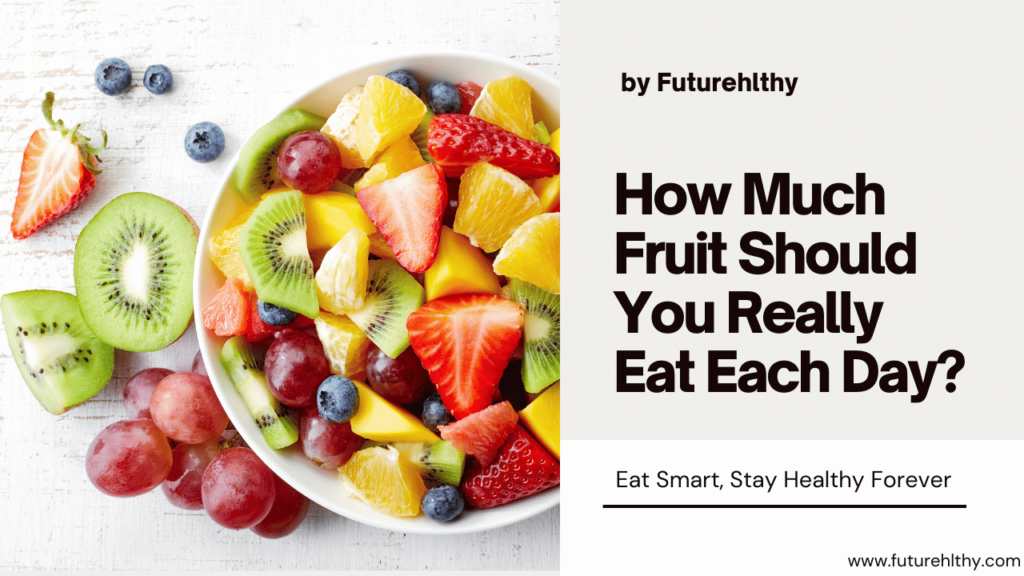How Much Fruit You Really Eat Every Day

Fruits are nature’s sweet treats, packed with essential nutrients, vitamins, and antioxidants that play a vital role in keeping your body healthy. But when it comes to your recommended daily fruit intake, how much fruit should you really eat each day? Understanding your recommended daily fruit intake is essential for maintaining a balanced diet. Some people think more is better, while others worry about the sugar content in fruit. In this article, we will explore the recommended daily fruit intake, whether seven fruits a day is too much, the best fruits to eat daily, and whether too much fruit can be harmful.
How Much Fruit Are You Supposed to Eat a Day?
The amount of fruit you should eat daily depends on factors like age, sex, activity level, and overall health. According to the Centers for Disease Control and Prevention (CDC), adults should aim for 1.5 to 2 cups of fruit each day. This recommendation is based on a diet of around 2,000 calories a day, but your needs might vary.
The Dietary Guidelines for Americans suggest that half your plate should be filled with fruits and vegetables. This means eating a variety of fruits is important to get different nutrients.
But how much is too much?
While fruit is healthy, eating too much, especially in the form of juices or dried fruit, can lead to excess sugar and calories.
Is 7 Fruits a Day Too Much?
Eating seven servings of fruit daily may seem like a lot, but for some people, it’s a healthy goal. However, there are a few things to consider.
1. Nutrient Density vs. Caloric Intake:
- Eating seven servings of fruit can provide a lot of essential nutrients like vitamin C, potassium, and fiber. But it’s important to balance this with other foods like vegetables, proteins, and grains to ensure a balanced diet.
- If you’re watching your calorie intake or managing conditions like diabetes, eating a lot of fruit might not be ideal. Fruits, though healthy, still contain natural sugars that add to your calorie count.
2. The Type of Fruit Matters:
- Not all fruits are the same. Some, like berries, apples, and oranges, are lower in sugar and calories but high in fiber and antioxidants. Others, like bananas, mangoes, and grapes, have more sugar and calories. If you’re eating seven servings of fruit, it’s important to choose a variety of types to avoid too much sugar.
3. Individual Health Needs:
- People with certain health conditions, like insulin resistance or metabolic syndrome, may need to watch their fruit intake more closely. Seven servings might be too much if you need to control blood sugar levels.
In short, while seven servings of fruit a day can be healthy for many, balance is key. Choose a variety of fruits and mix them with other nutritious foods.
What Fruit Should You Eat Every Day?
Eating a variety of fruits daily ensures you get a wide range of nutrients. However, some fruits offer more health benefits than others.
1. Berries (Blueberries, Strawberries, Raspberries):
- Why They’re Good: Berries are full of antioxidants, especially vitamin C and flavonoids. These help reduce inflammation and protect against chronic diseases.
- Daily Serving Suggestion: One cup of mixed berries makes a great addition to breakfast or a healthy snack.
2. Apples:
- Why They’re Good: Apples are high in dietary fiber, particularly pectin, which supports digestion and helps control blood sugar levels.
- Daily Serving Suggestion: One medium-sized apple can provide a good portion of your daily fiber needs.
3. Bananas:
- Why They’re Good: Bananas are an excellent source of potassium, which is important for heart health and maintaining healthy blood pressure.
- Daily Serving Suggestion: One banana a day is a convenient snack that can boost your energy.
4. Citrus Fruits (Oranges, Grapefruits, Lemons):
- Why They’re Good: Citrus fruits are rich in vitamin C, which is essential for immune health, skin health, and absorbing iron from plant-based foods.
- Daily Serving Suggestion: One medium orange or half a grapefruit can provide your daily dose of vitamin C.
5. Avocado:
- Why They’re Good: Though often thought of as a vegetable, avocado is a fruit. It’s high in healthy fats that support heart health and help keep you full.
- Daily Serving Suggestion: Half an avocado is a great addition to salads or toast.
Eating a mix of these fruits daily ensures you get a wide range of nutrients that promote overall health.
Is Too Much Fruit Unhealthy?
Fruits are healthy, but can you eat too much? The answer is yes, especially when considering the sugar content and overall balance of your diet.
1. Sugar Content:
- Natural Sugars vs. Added Sugars: Fruits contain natural sugars, which are healthier than added sugars found in processed foods. But eating a lot of fruit can still lead to too much sugar in your diet, which may contribute to weight gain, blood sugar spikes, and dental issues.
- Fructose Concerns: Some studies suggest that too much fructose, even from natural sources like fruit, can lead to insulin resistance and fatty liver disease.
2. Caloric Intake:
- While fruits are lower in calories compared to many processed snacks, they still add to your total calorie intake. Eating large amounts of fruit without considering your overall calorie needs could lead to weight gain.
- If you’re on a calorie-restricted diet or trying to lose weight, it’s important to monitor your fruit consumption and make sure it fits within your daily calorie goals.
3. Nutrient Imbalance:
- Eating too much fruit can crowd out other essential food groups, leading to potential nutrient gaps. A diet too rich in fruit might lack enough protein, healthy fats, and certain vitamins and minerals that fruits don’t provide.
- For a balanced diet, it’s important to eat fruit along with other nutrient-rich foods.
4. Digestive Issues:
- Eating too much fruit can lead to digestive discomfort for some people, including bloating, gas, and diarrhea. This is often due to the high fiber content in fruit, which is beneficial in moderation but can cause issues when consumed in excess.
In summary, while fruit is an important part of a healthy diet, moderation is key. Balancing fruit intake with other foods and being mindful of your overall sugar and calorie intake will help you enjoy the benefits of fruit without any drawbacks.
Final Thoughts
Fruit is a vital part of a balanced diet. It provides essential vitamins, minerals, and antioxidants that support overall health. However, like everything, it’s important to eat fruit in moderation and along with a variety of other foods. While eating seven servings of fruit a day might work for some, others may need to watch their intake, especially if they have specific health concerns.
By focusing on a variety of fruits, particularly those rich in nutrients and low in sugar, you can make the most of your daily fruit intake. Remember, the key to a healthy diet is balance, and fruit is just one important piece of the puzzle.
see more : Easy Smoothie Recipes with 3 Ingredients: Simple, Delicious, and Nutritious







